Report: Colorectal Cancer Etiology, Health Practices, and Education
VerifiedAdded on 2021/02/22
|9
|2545
|131
Report
AI Summary
This report provides a comprehensive overview of colorectal cancer, addressing its etiology, current health practices, and the role of health education in early detection and assessment. The introduction highlights colorectal cancer as a significant global health concern, particularly in Malaysia, emphasizing the influence of diverse ethnic groups. The main body delves into the causes, including genetic factors, lifestyle choices, and general risk factors like age. It discusses current health practices and guidelines, such as screening procedures and the importance of patient-centric care. The report also emphasizes the significance of health education in communities to raise awareness about symptoms, causes, and early detection methods, as well as the importance of lifestyle changes. The conclusion summarizes the key findings, stressing the need for continued education and the implementation of systematic screening programs to reduce the impact of colorectal cancer. The report is supported by several references from books and journals.
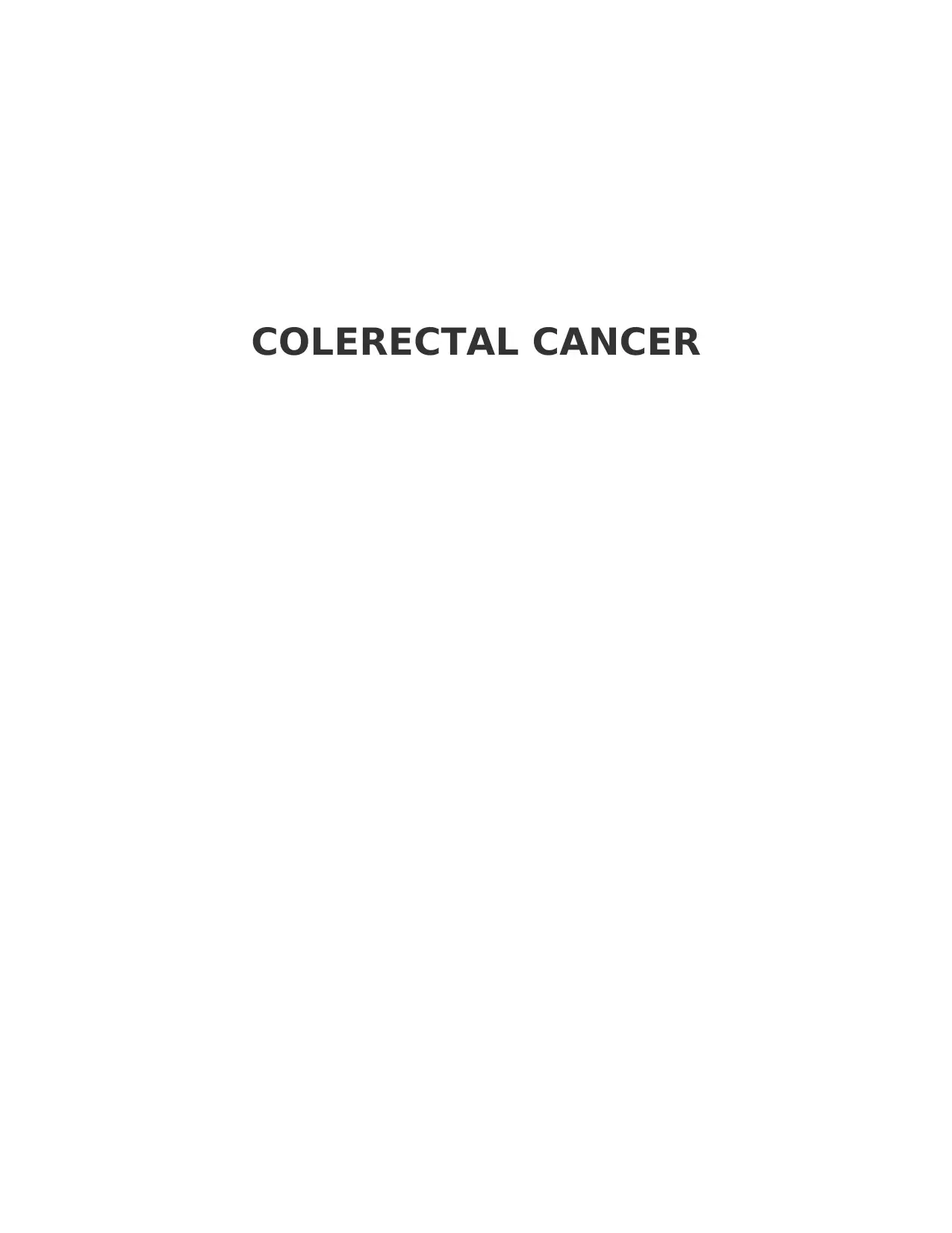
COLERECTAL CANCER
Paraphrase This Document
Need a fresh take? Get an instant paraphrase of this document with our AI Paraphraser
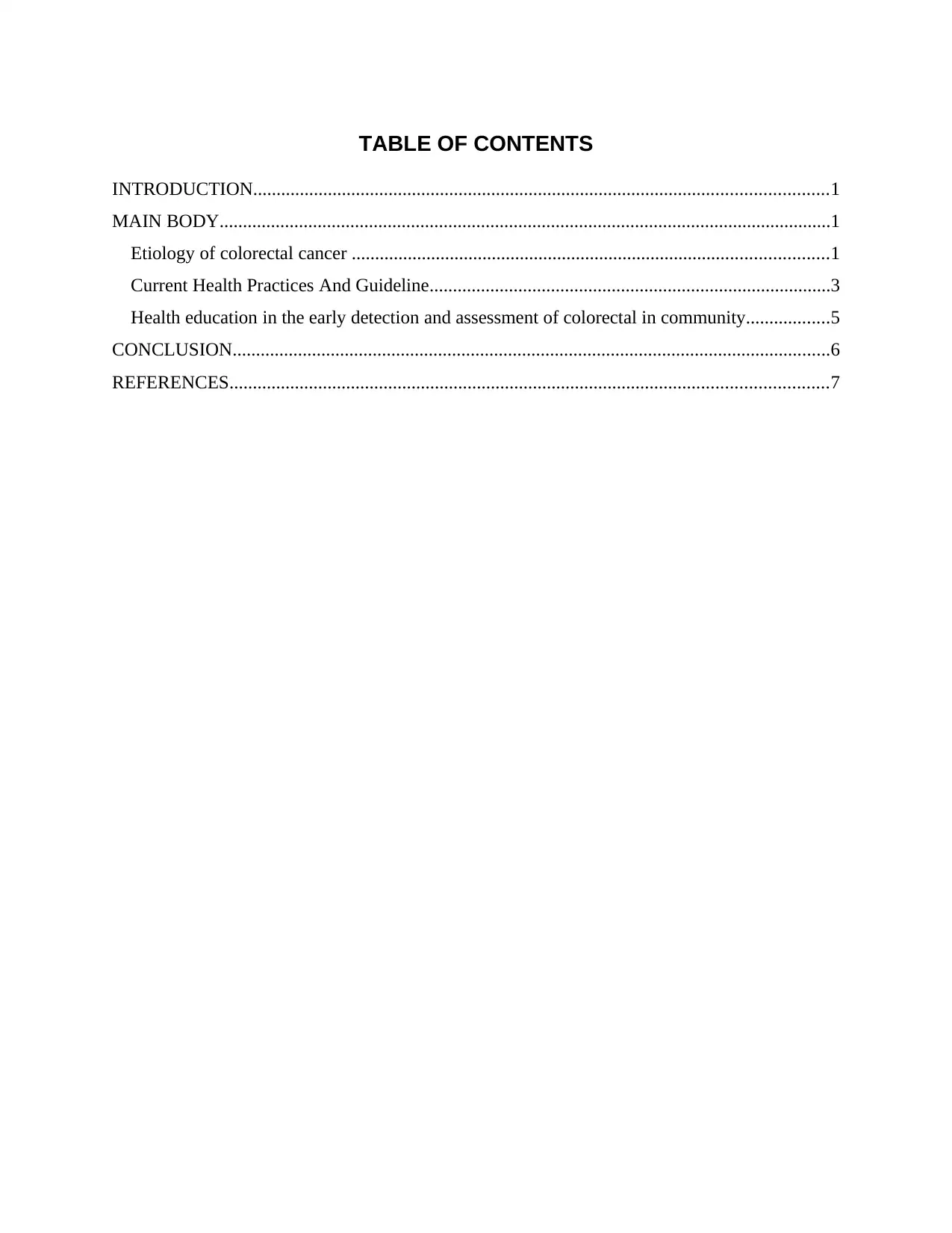
TABLE OF CONTENTS
INTRODUCTION...........................................................................................................................1
MAIN BODY...................................................................................................................................1
Etiology of colorectal cancer ......................................................................................................1
Current Health Practices And Guideline......................................................................................3
Health education in the early detection and assessment of colorectal in community..................5
CONCLUSION................................................................................................................................6
REFERENCES................................................................................................................................7
INTRODUCTION...........................................................................................................................1
MAIN BODY...................................................................................................................................1
Etiology of colorectal cancer ......................................................................................................1
Current Health Practices And Guideline......................................................................................3
Health education in the early detection and assessment of colorectal in community..................5
CONCLUSION................................................................................................................................6
REFERENCES................................................................................................................................7
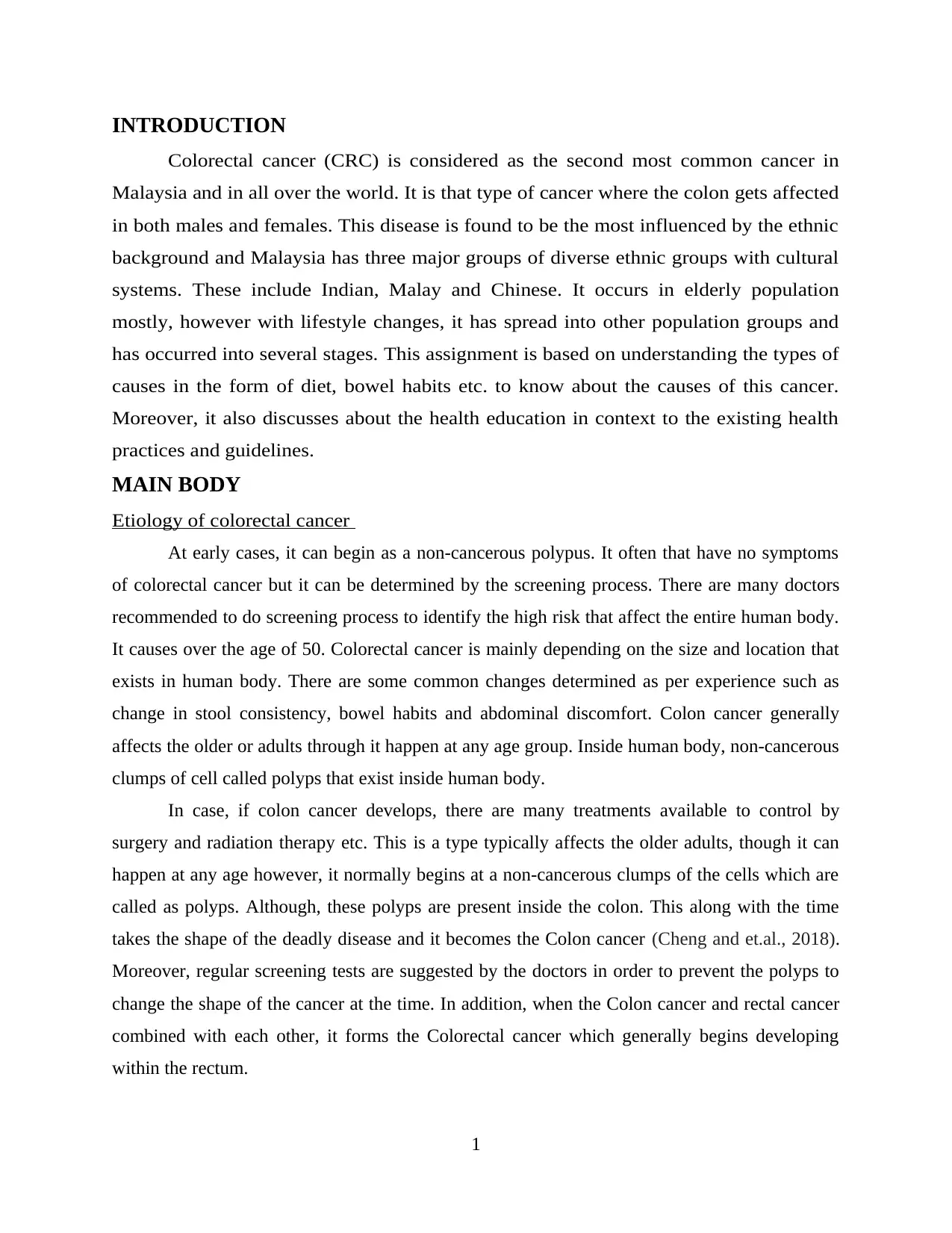
INTRODUCTION
Colorectal cancer (CRC) is considered as the second most common cancer in
Malaysia and in all over the world. It is that type of cancer where the colon gets affected
in both males and females. This disease is found to be the most influenced by the ethnic
background and Malaysia has three major groups of diverse ethnic groups with cultural
systems. These include Indian, Malay and Chinese. It occurs in elderly population
mostly, however with lifestyle changes, it has spread into other population groups and
has occurred into several stages. This assignment is based on understanding the types of
causes in the form of diet, bowel habits etc. to know about the causes of this cancer.
Moreover, it also discusses about the health education in context to the existing health
practices and guidelines.
MAIN BODY
Etiology of colorectal cancer
At early cases, it can begin as a non-cancerous polypus. It often that have no symptoms
of colorectal cancer but it can be determined by the screening process. There are many doctors
recommended to do screening process to identify the high risk that affect the entire human body.
It causes over the age of 50. Colorectal cancer is mainly depending on the size and location that
exists in human body. There are some common changes determined as per experience such as
change in stool consistency, bowel habits and abdominal discomfort. Colon cancer generally
affects the older or adults through it happen at any age group. Inside human body, non-cancerous
clumps of cell called polyps that exist inside human body.
In case, if colon cancer develops, there are many treatments available to control by
surgery and radiation therapy etc. This is a type typically affects the older adults, though it can
happen at any age however, it normally begins at a non-cancerous clumps of the cells which are
called as polyps. Although, these polyps are present inside the colon. This along with the time
takes the shape of the deadly disease and it becomes the Colon cancer (Cheng and et.al., 2018).
Moreover, regular screening tests are suggested by the doctors in order to prevent the polyps to
change the shape of the cancer at the time. In addition, when the Colon cancer and rectal cancer
combined with each other, it forms the Colorectal cancer which generally begins developing
within the rectum.
1
Colorectal cancer (CRC) is considered as the second most common cancer in
Malaysia and in all over the world. It is that type of cancer where the colon gets affected
in both males and females. This disease is found to be the most influenced by the ethnic
background and Malaysia has three major groups of diverse ethnic groups with cultural
systems. These include Indian, Malay and Chinese. It occurs in elderly population
mostly, however with lifestyle changes, it has spread into other population groups and
has occurred into several stages. This assignment is based on understanding the types of
causes in the form of diet, bowel habits etc. to know about the causes of this cancer.
Moreover, it also discusses about the health education in context to the existing health
practices and guidelines.
MAIN BODY
Etiology of colorectal cancer
At early cases, it can begin as a non-cancerous polypus. It often that have no symptoms
of colorectal cancer but it can be determined by the screening process. There are many doctors
recommended to do screening process to identify the high risk that affect the entire human body.
It causes over the age of 50. Colorectal cancer is mainly depending on the size and location that
exists in human body. There are some common changes determined as per experience such as
change in stool consistency, bowel habits and abdominal discomfort. Colon cancer generally
affects the older or adults through it happen at any age group. Inside human body, non-cancerous
clumps of cell called polyps that exist inside human body.
In case, if colon cancer develops, there are many treatments available to control by
surgery and radiation therapy etc. This is a type typically affects the older adults, though it can
happen at any age however, it normally begins at a non-cancerous clumps of the cells which are
called as polyps. Although, these polyps are present inside the colon. This along with the time
takes the shape of the deadly disease and it becomes the Colon cancer (Cheng and et.al., 2018).
Moreover, regular screening tests are suggested by the doctors in order to prevent the polyps to
change the shape of the cancer at the time. In addition, when the Colon cancer and rectal cancer
combined with each other, it forms the Colorectal cancer which generally begins developing
within the rectum.
1
⊘ This is a preview!⊘
Do you want full access?
Subscribe today to unlock all pages.

Trusted by 1+ million students worldwide
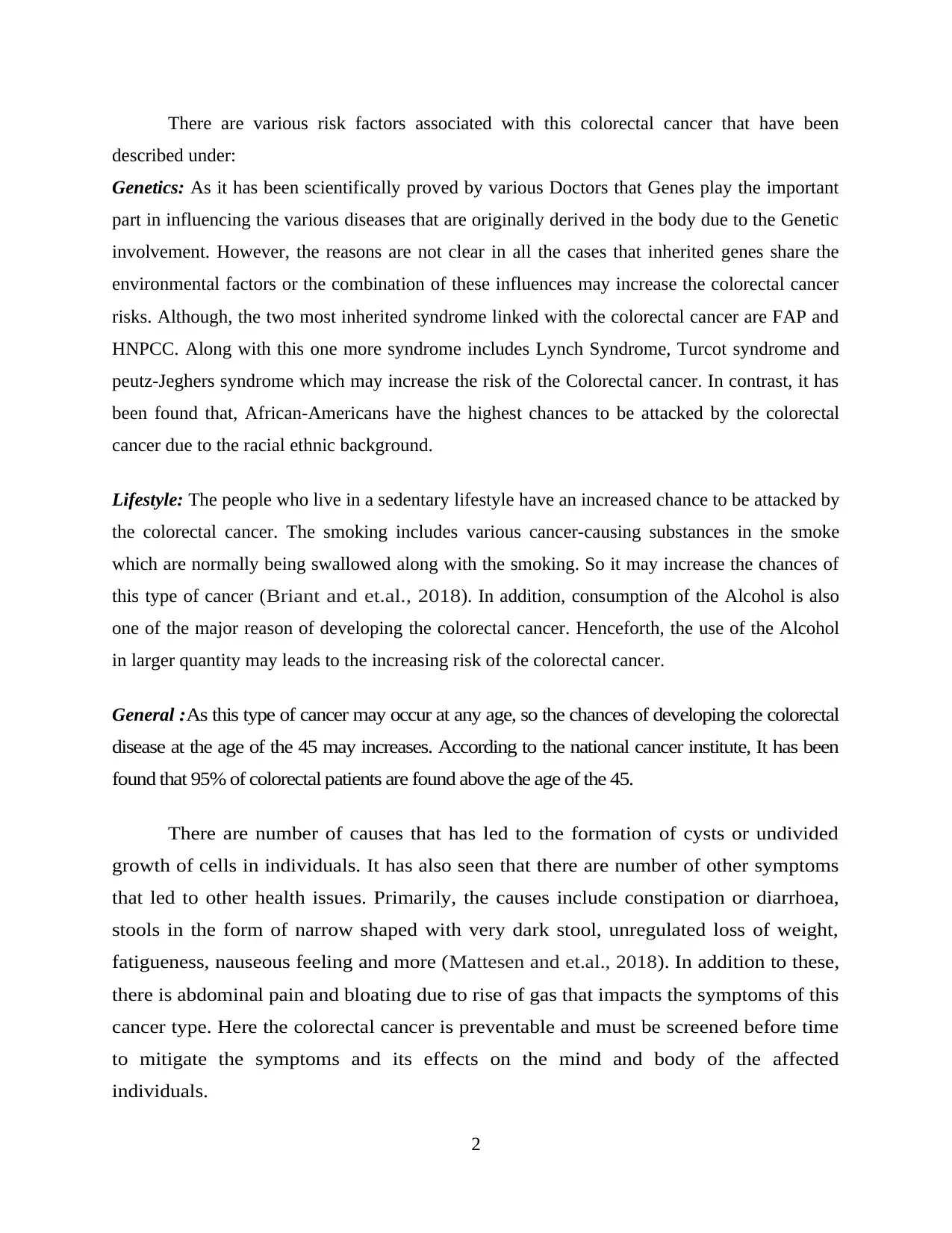
There are various risk factors associated with this colorectal cancer that have been
described under:
Genetics: As it has been scientifically proved by various Doctors that Genes play the important
part in influencing the various diseases that are originally derived in the body due to the Genetic
involvement. However, the reasons are not clear in all the cases that inherited genes share the
environmental factors or the combination of these influences may increase the colorectal cancer
risks. Although, the two most inherited syndrome linked with the colorectal cancer are FAP and
HNPCC. Along with this one more syndrome includes Lynch Syndrome, Turcot syndrome and
peutz-Jeghers syndrome which may increase the risk of the Colorectal cancer. In contrast, it has
been found that, African-Americans have the highest chances to be attacked by the colorectal
cancer due to the racial ethnic background.
Lifestyle: The people who live in a sedentary lifestyle have an increased chance to be attacked by
the colorectal cancer. The smoking includes various cancer-causing substances in the smoke
which are normally being swallowed along with the smoking. So it may increase the chances of
this type of cancer ( Briant and et.al., 2018). In addition, consumption of the Alcohol is also
one of the major reason of developing the colorectal cancer. Henceforth, the use of the Alcohol
in larger quantity may leads to the increasing risk of the colorectal cancer.
General :As this type of cancer may occur at any age, so the chances of developing the colorectal
disease at the age of the 45 may increases. According to the national cancer institute, It has been
found that 95% of colorectal patients are found above the age of the 45.
There are number of causes that has led to the formation of cysts or undivided
growth of cells in individuals. It has also seen that there are number of other symptoms
that led to other health issues. Primarily, the causes include constipation or diarrhoea,
stools in the form of narrow shaped with very dark stool, unregulated loss of weight,
fatigueness, nauseous feeling and more (Mattesen and et.al., 2018). In addition to these,
there is abdominal pain and bloating due to rise of gas that impacts the symptoms of this
cancer type. Here the colorectal cancer is preventable and must be screened before time
to mitigate the symptoms and its effects on the mind and body of the affected
individuals.
2
described under:
Genetics: As it has been scientifically proved by various Doctors that Genes play the important
part in influencing the various diseases that are originally derived in the body due to the Genetic
involvement. However, the reasons are not clear in all the cases that inherited genes share the
environmental factors or the combination of these influences may increase the colorectal cancer
risks. Although, the two most inherited syndrome linked with the colorectal cancer are FAP and
HNPCC. Along with this one more syndrome includes Lynch Syndrome, Turcot syndrome and
peutz-Jeghers syndrome which may increase the risk of the Colorectal cancer. In contrast, it has
been found that, African-Americans have the highest chances to be attacked by the colorectal
cancer due to the racial ethnic background.
Lifestyle: The people who live in a sedentary lifestyle have an increased chance to be attacked by
the colorectal cancer. The smoking includes various cancer-causing substances in the smoke
which are normally being swallowed along with the smoking. So it may increase the chances of
this type of cancer ( Briant and et.al., 2018). In addition, consumption of the Alcohol is also
one of the major reason of developing the colorectal cancer. Henceforth, the use of the Alcohol
in larger quantity may leads to the increasing risk of the colorectal cancer.
General :As this type of cancer may occur at any age, so the chances of developing the colorectal
disease at the age of the 45 may increases. According to the national cancer institute, It has been
found that 95% of colorectal patients are found above the age of the 45.
There are number of causes that has led to the formation of cysts or undivided
growth of cells in individuals. It has also seen that there are number of other symptoms
that led to other health issues. Primarily, the causes include constipation or diarrhoea,
stools in the form of narrow shaped with very dark stool, unregulated loss of weight,
fatigueness, nauseous feeling and more (Mattesen and et.al., 2018). In addition to these,
there is abdominal pain and bloating due to rise of gas that impacts the symptoms of this
cancer type. Here the colorectal cancer is preventable and must be screened before time
to mitigate the symptoms and its effects on the mind and body of the affected
individuals.
2
Paraphrase This Document
Need a fresh take? Get an instant paraphrase of this document with our AI Paraphraser
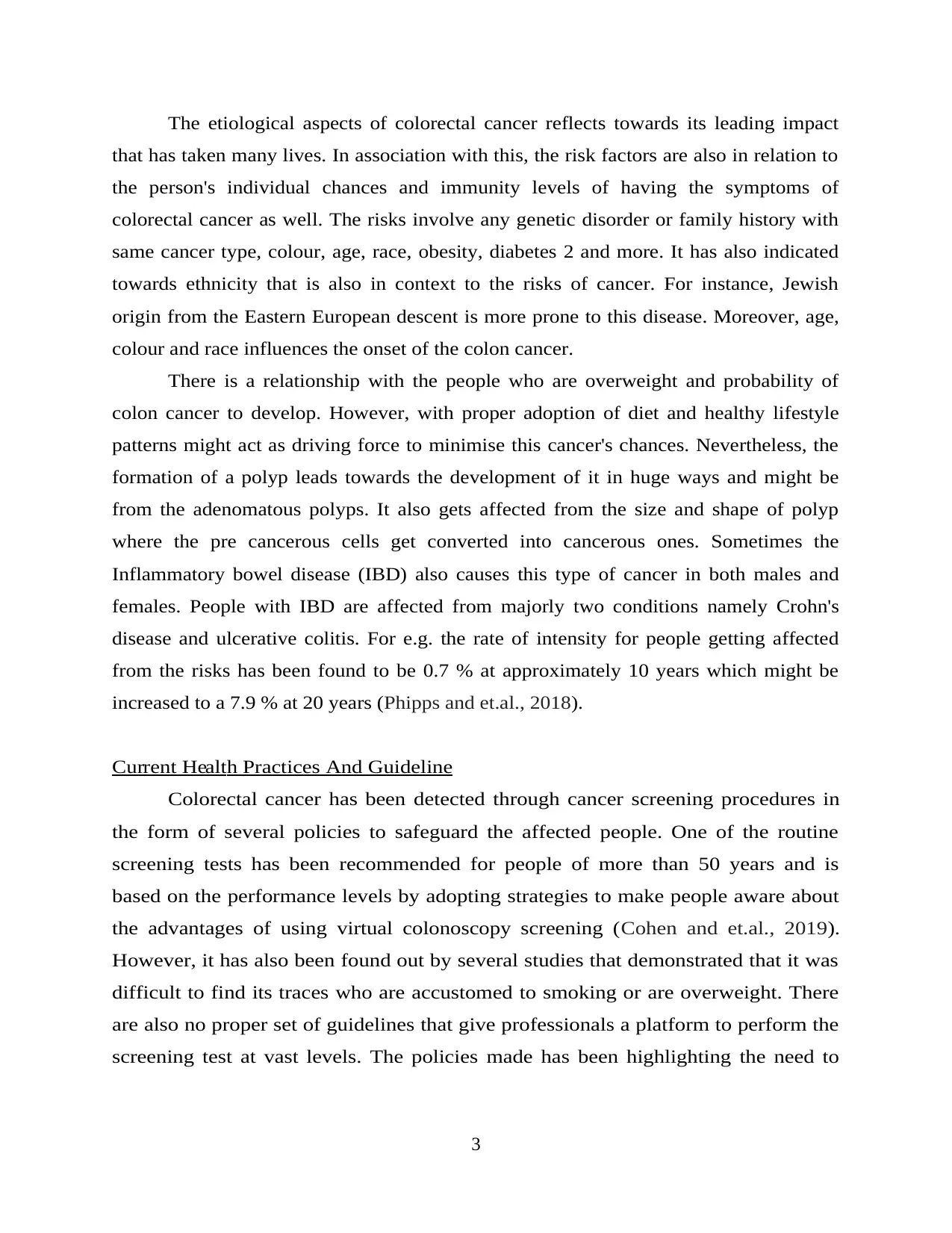
The etiological aspects of colorectal cancer reflects towards its leading impact
that has taken many lives. In association with this, the risk factors are also in relation to
the person's individual chances and immunity levels of having the symptoms of
colorectal cancer as well. The risks involve any genetic disorder or family history with
same cancer type, colour, age, race, obesity, diabetes 2 and more. It has also indicated
towards ethnicity that is also in context to the risks of cancer. For instance, Jewish
origin from the Eastern European descent is more prone to this disease. Moreover, age,
colour and race influences the onset of the colon cancer.
There is a relationship with the people who are overweight and probability of
colon cancer to develop. However, with proper adoption of diet and healthy lifestyle
patterns might act as driving force to minimise this cancer's chances. Nevertheless, the
formation of a polyp leads towards the development of it in huge ways and might be
from the adenomatous polyps. It also gets affected from the size and shape of polyp
where the pre cancerous cells get converted into cancerous ones. Sometimes the
Inflammatory bowel disease (IBD) also causes this type of cancer in both males and
females. People with IBD are affected from majorly two conditions namely Crohn's
disease and ulcerative colitis. For e.g. the rate of intensity for people getting affected
from the risks has been found to be 0.7 % at approximately 10 years which might be
increased to a 7.9 % at 20 years (Phipps and et.al., 2018).
Current Health Practices And Guideline
Colorectal cancer has been detected through cancer screening procedures in
the form of several policies to safeguard the affected people. One of the routine
screening tests has been recommended for people of more than 50 years and is
based on the performance levels by adopting strategies to make people aware about
the advantages of using virtual colonoscopy screening (Cohen and et.al., 2019).
However, it has also been found out by several studies that demonstrated that it was
difficult to find its traces who are accustomed to smoking or are overweight. There
are also no proper set of guidelines that give professionals a platform to perform the
screening test at vast levels. The policies made has been highlighting the need to
3
that has taken many lives. In association with this, the risk factors are also in relation to
the person's individual chances and immunity levels of having the symptoms of
colorectal cancer as well. The risks involve any genetic disorder or family history with
same cancer type, colour, age, race, obesity, diabetes 2 and more. It has also indicated
towards ethnicity that is also in context to the risks of cancer. For instance, Jewish
origin from the Eastern European descent is more prone to this disease. Moreover, age,
colour and race influences the onset of the colon cancer.
There is a relationship with the people who are overweight and probability of
colon cancer to develop. However, with proper adoption of diet and healthy lifestyle
patterns might act as driving force to minimise this cancer's chances. Nevertheless, the
formation of a polyp leads towards the development of it in huge ways and might be
from the adenomatous polyps. It also gets affected from the size and shape of polyp
where the pre cancerous cells get converted into cancerous ones. Sometimes the
Inflammatory bowel disease (IBD) also causes this type of cancer in both males and
females. People with IBD are affected from majorly two conditions namely Crohn's
disease and ulcerative colitis. For e.g. the rate of intensity for people getting affected
from the risks has been found to be 0.7 % at approximately 10 years which might be
increased to a 7.9 % at 20 years (Phipps and et.al., 2018).
Current Health Practices And Guideline
Colorectal cancer has been detected through cancer screening procedures in
the form of several policies to safeguard the affected people. One of the routine
screening tests has been recommended for people of more than 50 years and is
based on the performance levels by adopting strategies to make people aware about
the advantages of using virtual colonoscopy screening (Cohen and et.al., 2019).
However, it has also been found out by several studies that demonstrated that it was
difficult to find its traces who are accustomed to smoking or are overweight. There
are also no proper set of guidelines that give professionals a platform to perform the
screening test at vast levels. The policies made has been highlighting the need to
3
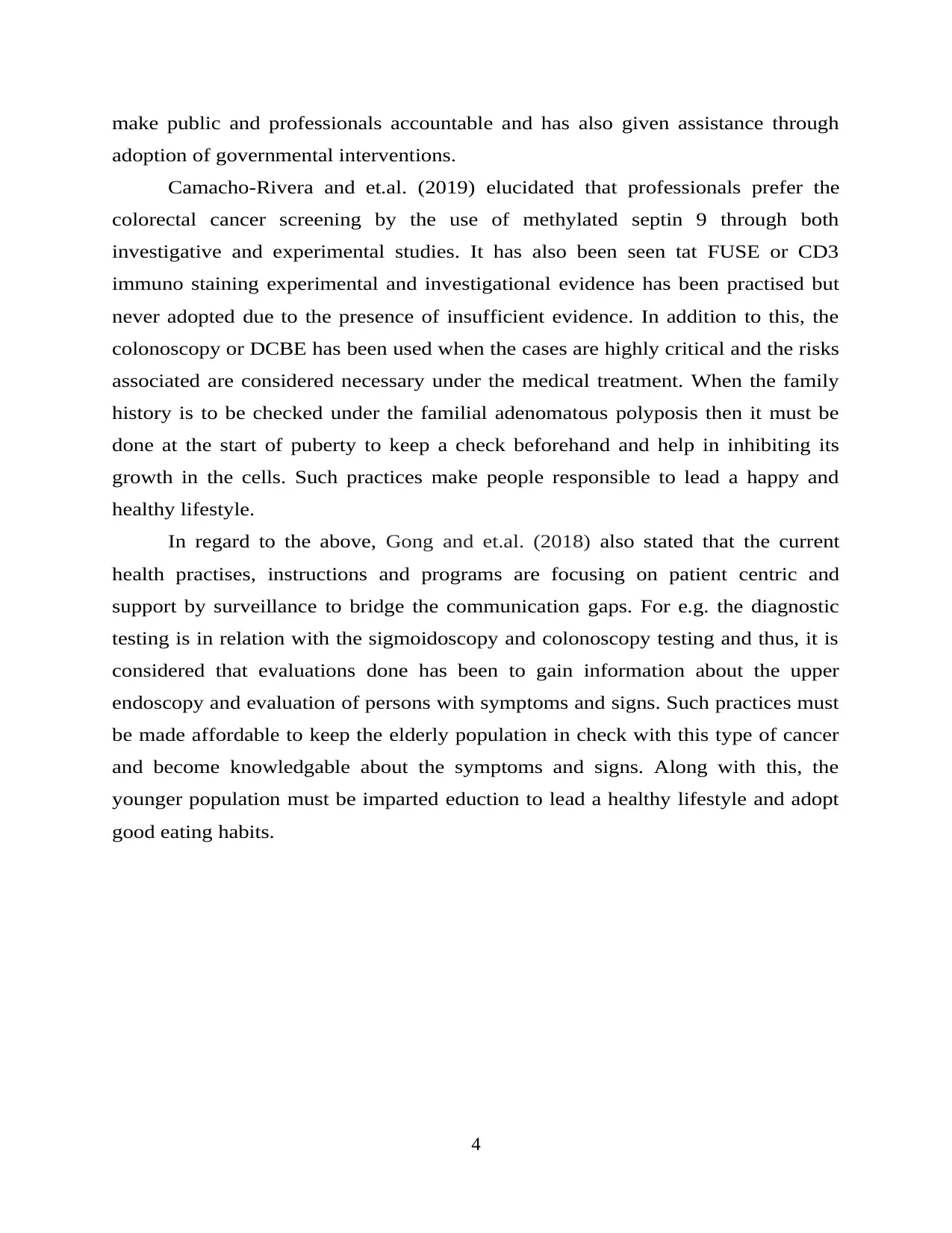
make public and professionals accountable and has also given assistance through
adoption of governmental interventions.
Camacho-Rivera and et.al. (2019) elucidated that professionals prefer the
colorectal cancer screening by the use of methylated septin 9 through both
investigative and experimental studies. It has also been seen tat FUSE or CD3
immuno staining experimental and investigational evidence has been practised but
never adopted due to the presence of insufficient evidence. In addition to this, the
colonoscopy or DCBE has been used when the cases are highly critical and the risks
associated are considered necessary under the medical treatment. When the family
history is to be checked under the familial adenomatous polyposis then it must be
done at the start of puberty to keep a check beforehand and help in inhibiting its
growth in the cells. Such practices make people responsible to lead a happy and
healthy lifestyle.
In regard to the above, Gong and et.al. (2018) also stated that the current
health practises, instructions and programs are focusing on patient centric and
support by surveillance to bridge the communication gaps. For e.g. the diagnostic
testing is in relation with the sigmoidoscopy and colonoscopy testing and thus, it is
considered that evaluations done has been to gain information about the upper
endoscopy and evaluation of persons with symptoms and signs. Such practices must
be made affordable to keep the elderly population in check with this type of cancer
and become knowledgable about the symptoms and signs. Along with this, the
younger population must be imparted eduction to lead a healthy lifestyle and adopt
good eating habits.
4
adoption of governmental interventions.
Camacho-Rivera and et.al. (2019) elucidated that professionals prefer the
colorectal cancer screening by the use of methylated septin 9 through both
investigative and experimental studies. It has also been seen tat FUSE or CD3
immuno staining experimental and investigational evidence has been practised but
never adopted due to the presence of insufficient evidence. In addition to this, the
colonoscopy or DCBE has been used when the cases are highly critical and the risks
associated are considered necessary under the medical treatment. When the family
history is to be checked under the familial adenomatous polyposis then it must be
done at the start of puberty to keep a check beforehand and help in inhibiting its
growth in the cells. Such practices make people responsible to lead a happy and
healthy lifestyle.
In regard to the above, Gong and et.al. (2018) also stated that the current
health practises, instructions and programs are focusing on patient centric and
support by surveillance to bridge the communication gaps. For e.g. the diagnostic
testing is in relation with the sigmoidoscopy and colonoscopy testing and thus, it is
considered that evaluations done has been to gain information about the upper
endoscopy and evaluation of persons with symptoms and signs. Such practices must
be made affordable to keep the elderly population in check with this type of cancer
and become knowledgable about the symptoms and signs. Along with this, the
younger population must be imparted eduction to lead a healthy lifestyle and adopt
good eating habits.
4
⊘ This is a preview!⊘
Do you want full access?
Subscribe today to unlock all pages.

Trusted by 1+ million students worldwide
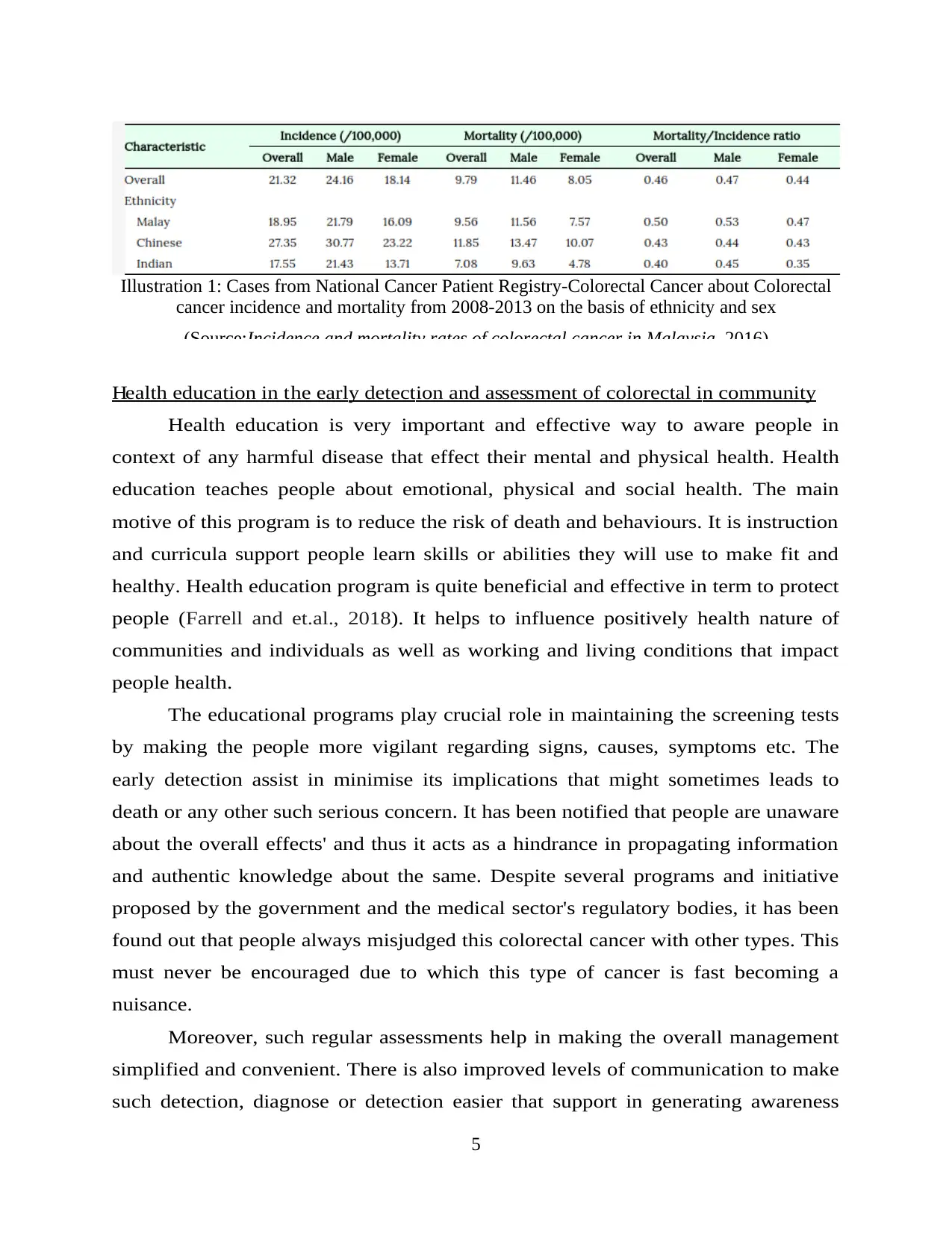
Health education in the early detection and assessment of colorectal in community
Health education is very important and effective way to aware people in
context of any harmful disease that effect their mental and physical health. Health
education teaches people about emotional, physical and social health. The main
motive of this program is to reduce the risk of death and behaviours. It is instruction
and curricula support people learn skills or abilities they will use to make fit and
healthy. Health education program is quite beneficial and effective in term to protect
people (Farrell and et.al., 2018). It helps to influence positively health nature of
communities and individuals as well as working and living conditions that impact
people health.
The educational programs play crucial role in maintaining the screening tests
by making the people more vigilant regarding signs, causes, symptoms etc. The
early detection assist in minimise its implications that might sometimes leads to
death or any other such serious concern. It has been notified that people are unaware
about the overall effects' and thus it acts as a hindrance in propagating information
and authentic knowledge about the same. Despite several programs and initiative
proposed by the government and the medical sector's regulatory bodies, it has been
found out that people always misjudged this colorectal cancer with other types. This
must never be encouraged due to which this type of cancer is fast becoming a
nuisance.
Moreover, such regular assessments help in making the overall management
simplified and convenient. There is also improved levels of communication to make
such detection, diagnose or detection easier that support in generating awareness
5
Illustration 1: Cases from National Cancer Patient Registry-Colorectal Cancer about Colorectal
cancer incidence and mortality from 2008-2013 on the basis of ethnicity and sex
(Source:Incidence and mortality rates of colorectal cancer in Malaysia, 2016)
Health education is very important and effective way to aware people in
context of any harmful disease that effect their mental and physical health. Health
education teaches people about emotional, physical and social health. The main
motive of this program is to reduce the risk of death and behaviours. It is instruction
and curricula support people learn skills or abilities they will use to make fit and
healthy. Health education program is quite beneficial and effective in term to protect
people (Farrell and et.al., 2018). It helps to influence positively health nature of
communities and individuals as well as working and living conditions that impact
people health.
The educational programs play crucial role in maintaining the screening tests
by making the people more vigilant regarding signs, causes, symptoms etc. The
early detection assist in minimise its implications that might sometimes leads to
death or any other such serious concern. It has been notified that people are unaware
about the overall effects' and thus it acts as a hindrance in propagating information
and authentic knowledge about the same. Despite several programs and initiative
proposed by the government and the medical sector's regulatory bodies, it has been
found out that people always misjudged this colorectal cancer with other types. This
must never be encouraged due to which this type of cancer is fast becoming a
nuisance.
Moreover, such regular assessments help in making the overall management
simplified and convenient. There is also improved levels of communication to make
such detection, diagnose or detection easier that support in generating awareness
5
Illustration 1: Cases from National Cancer Patient Registry-Colorectal Cancer about Colorectal
cancer incidence and mortality from 2008-2013 on the basis of ethnicity and sex
(Source:Incidence and mortality rates of colorectal cancer in Malaysia, 2016)
Paraphrase This Document
Need a fresh take? Get an instant paraphrase of this document with our AI Paraphraser
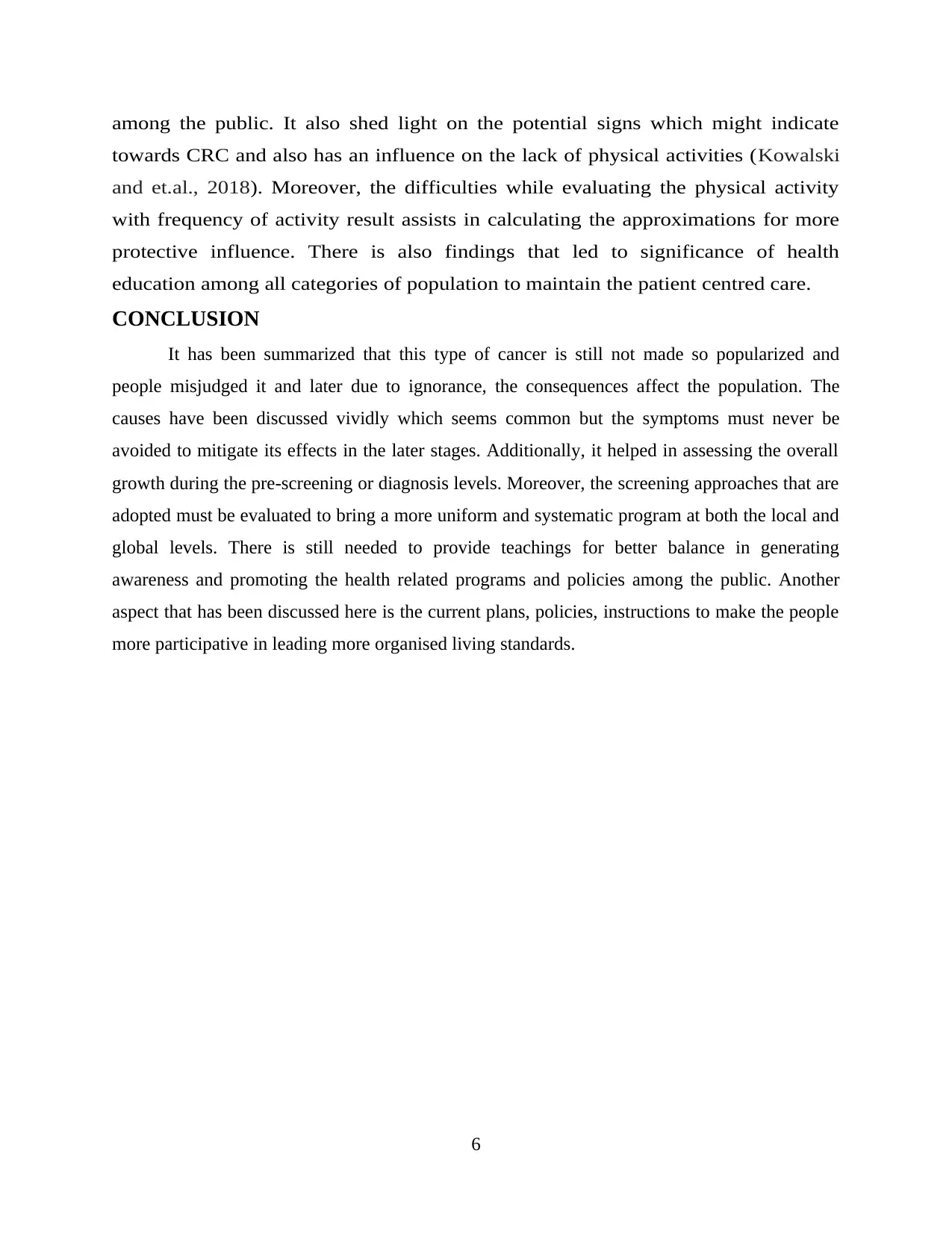
among the public. It also shed light on the potential signs which might indicate
towards CRC and also has an influence on the lack of physical activities (Kowalski
and et.al., 2018). Moreover, the difficulties while evaluating the physical activity
with frequency of activity result assists in calculating the approximations for more
protective influence. There is also findings that led to significance of health
education among all categories of population to maintain the patient centred care.
CONCLUSION
It has been summarized that this type of cancer is still not made so popularized and
people misjudged it and later due to ignorance, the consequences affect the population. The
causes have been discussed vividly which seems common but the symptoms must never be
avoided to mitigate its effects in the later stages. Additionally, it helped in assessing the overall
growth during the pre-screening or diagnosis levels. Moreover, the screening approaches that are
adopted must be evaluated to bring a more uniform and systematic program at both the local and
global levels. There is still needed to provide teachings for better balance in generating
awareness and promoting the health related programs and policies among the public. Another
aspect that has been discussed here is the current plans, policies, instructions to make the people
more participative in leading more organised living standards.
6
towards CRC and also has an influence on the lack of physical activities (Kowalski
and et.al., 2018). Moreover, the difficulties while evaluating the physical activity
with frequency of activity result assists in calculating the approximations for more
protective influence. There is also findings that led to significance of health
education among all categories of population to maintain the patient centred care.
CONCLUSION
It has been summarized that this type of cancer is still not made so popularized and
people misjudged it and later due to ignorance, the consequences affect the population. The
causes have been discussed vividly which seems common but the symptoms must never be
avoided to mitigate its effects in the later stages. Additionally, it helped in assessing the overall
growth during the pre-screening or diagnosis levels. Moreover, the screening approaches that are
adopted must be evaluated to bring a more uniform and systematic program at both the local and
global levels. There is still needed to provide teachings for better balance in generating
awareness and promoting the health related programs and policies among the public. Another
aspect that has been discussed here is the current plans, policies, instructions to make the people
more participative in leading more organised living standards.
6
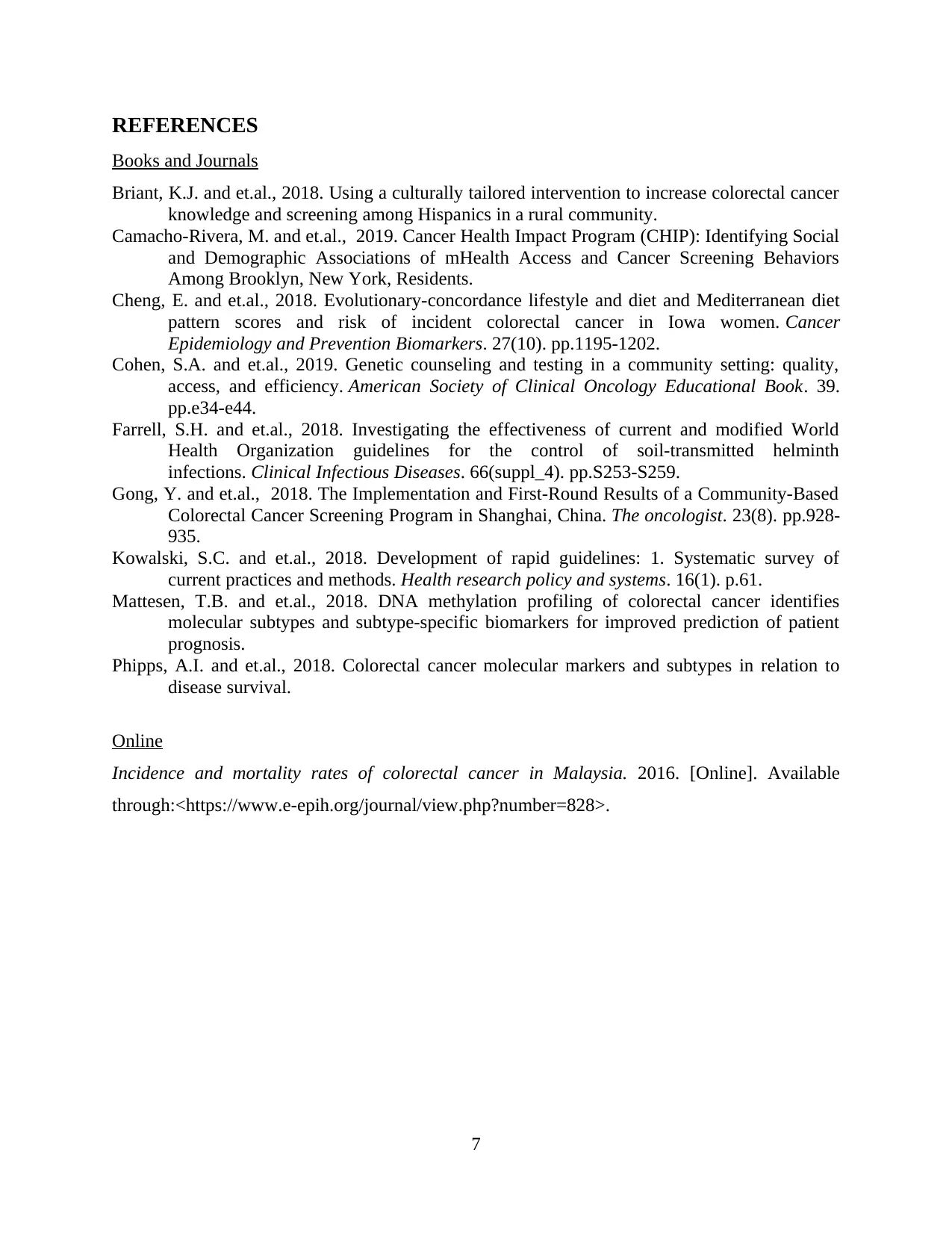
REFERENCES
Books and Journals
Briant, K.J. and et.al., 2018. Using a culturally tailored intervention to increase colorectal cancer
knowledge and screening among Hispanics in a rural community.
Camacho-Rivera, M. and et.al., 2019. Cancer Health Impact Program (CHIP): Identifying Social
and Demographic Associations of mHealth Access and Cancer Screening Behaviors
Among Brooklyn, New York, Residents.
Cheng, E. and et.al., 2018. Evolutionary-concordance lifestyle and diet and Mediterranean diet
pattern scores and risk of incident colorectal cancer in Iowa women. Cancer
Epidemiology and Prevention Biomarkers. 27(10). pp.1195-1202.
Cohen, S.A. and et.al., 2019. Genetic counseling and testing in a community setting: quality,
access, and efficiency. American Society of Clinical Oncology Educational Book. 39.
pp.e34-e44.
Farrell, S.H. and et.al., 2018. Investigating the effectiveness of current and modified World
Health Organization guidelines for the control of soil-transmitted helminth
infections. Clinical Infectious Diseases. 66(suppl_4). pp.S253-S259.
Gong, Y. and et.al., 2018. The Implementation and First‐Round Results of a Community‐Based
Colorectal Cancer Screening Program in Shanghai, China. The oncologist. 23(8). pp.928-
935.
Kowalski, S.C. and et.al., 2018. Development of rapid guidelines: 1. Systematic survey of
current practices and methods. Health research policy and systems. 16(1). p.61.
Mattesen, T.B. and et.al., 2018. DNA methylation profiling of colorectal cancer identifies
molecular subtypes and subtype-specific biomarkers for improved prediction of patient
prognosis.
Phipps, A.I. and et.al., 2018. Colorectal cancer molecular markers and subtypes in relation to
disease survival.
Online
Incidence and mortality rates of colorectal cancer in Malaysia. 2016. [Online]. Available
through:<https://www.e-epih.org/journal/view.php?number=828>.
7
Books and Journals
Briant, K.J. and et.al., 2018. Using a culturally tailored intervention to increase colorectal cancer
knowledge and screening among Hispanics in a rural community.
Camacho-Rivera, M. and et.al., 2019. Cancer Health Impact Program (CHIP): Identifying Social
and Demographic Associations of mHealth Access and Cancer Screening Behaviors
Among Brooklyn, New York, Residents.
Cheng, E. and et.al., 2018. Evolutionary-concordance lifestyle and diet and Mediterranean diet
pattern scores and risk of incident colorectal cancer in Iowa women. Cancer
Epidemiology and Prevention Biomarkers. 27(10). pp.1195-1202.
Cohen, S.A. and et.al., 2019. Genetic counseling and testing in a community setting: quality,
access, and efficiency. American Society of Clinical Oncology Educational Book. 39.
pp.e34-e44.
Farrell, S.H. and et.al., 2018. Investigating the effectiveness of current and modified World
Health Organization guidelines for the control of soil-transmitted helminth
infections. Clinical Infectious Diseases. 66(suppl_4). pp.S253-S259.
Gong, Y. and et.al., 2018. The Implementation and First‐Round Results of a Community‐Based
Colorectal Cancer Screening Program in Shanghai, China. The oncologist. 23(8). pp.928-
935.
Kowalski, S.C. and et.al., 2018. Development of rapid guidelines: 1. Systematic survey of
current practices and methods. Health research policy and systems. 16(1). p.61.
Mattesen, T.B. and et.al., 2018. DNA methylation profiling of colorectal cancer identifies
molecular subtypes and subtype-specific biomarkers for improved prediction of patient
prognosis.
Phipps, A.I. and et.al., 2018. Colorectal cancer molecular markers and subtypes in relation to
disease survival.
Online
Incidence and mortality rates of colorectal cancer in Malaysia. 2016. [Online]. Available
through:<https://www.e-epih.org/journal/view.php?number=828>.
7
⊘ This is a preview!⊘
Do you want full access?
Subscribe today to unlock all pages.

Trusted by 1+ million students worldwide
1 out of 9
Related Documents
Your All-in-One AI-Powered Toolkit for Academic Success.
+13062052269
info@desklib.com
Available 24*7 on WhatsApp / Email
![[object Object]](/_next/static/media/star-bottom.7253800d.svg)
Unlock your academic potential
Copyright © 2020–2025 A2Z Services. All Rights Reserved. Developed and managed by ZUCOL.





